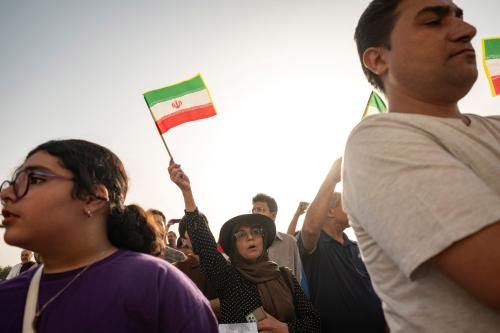The XXII Olympic Winter Games are well underway in Sochi, Russia. During the commentary in-between bouts of competition, check out these books, articles and papers from Brookings on Russia, its economy and politics, relations with neighbors and the world, and Vladimir Putin himself.
• After the Olympic Games in Russia, No More Mr. Nice Putin, by Fiona Hill and Steven Pifer
• A Ukraine in Crisis Between Russia and the West, by Steven Pifer
• The Moscow Missile Mystery: Is Russia Actually Violating the INF Treaty? by Steven Pifer
More research on Russia here and also from the Center on the United States and Europe.
 “Putin’s Russia Goes Rogue” – A Big Bets & Black Swans presidential memo
“Putin’s Russia Goes Rogue” – A Big Bets & Black Swans presidential memo
To punish Moldova, Georgia and Ukraine for their efforts to deepen relations with the European Union, Putin’s Russia could resort to trade sanctions, gas cut-offs and other pressures, say Fiona Hill and Steven Pifer. While U.S. leverage is limited, President Obama should develop a common line with the European Union that such Russian actions would have consequences for its relations with the West.
 Mr. Putin: Operative in the Kremlin
Mr. Putin: Operative in the Kremlin
In Mr. Putin, Russia experts Fiona Hill and Clifford Gaddy argue that Russia’s President, Vladimir Putin, is in fact a man of many and complex identities. Drawing on a range of sources, including their own personal encounters, they describe six that are most essential: the Statist, the History Man, the Survivalist, the Outsider, the Free Marketeer, and the Case Officer. Understanding Putin’s multiple dimensions is crucial for policymakers trying to decide how best to deal with Russia.
 Still Ours to Lead: America, Rising Powers, and the Tension between Rivalry and Restraint
Still Ours to Lead: America, Rising Powers, and the Tension between Rivalry and Restraint
Available March 17, 2014
In Still Ours to Lead, Bruce Jones tells a nuanced story of American leadership. He artfully examines the tension between the impulse to rival the U.S.A and the incentives for restraint and cooperation among the rising powers. Both are alive and well in the current system, and the balance provides a continued ability to solve problems and to manage crises at roughly the same rate as when American dominance was unquestioned. Maintaining that balance is central to the question of whether we will live in a stable or unstable system in the period to come.
 The Fight for Influence: Russia in Central Asia
The Fight for Influence: Russia in Central Asia
Alexey Malashenko offers a comprehensive analysis of Russian policies and prospects in Central Asia. It is clear that Russian policy in the former Soviet space is entering uncharted territory. But does the ruling establishment understand the fundamental shifts under way? It is time for Moscow to rethink its approach to Central Asia.
 Russia and the New World Disorder
Russia and the New World Disorder
Available October 1, 2014
Russia has strongly reasserted itself on the international stage. In the worldview of President Vladimir Putin and the Kremlin, the inevitable decline of the West and rise of the rest provide an opportunity for Russia to fulfill its mission as an independent center of global power. What are the origins of this increasingly aggressive stance? What are the geopolitical ramifications? And what will be the likely outcomes? In this timely and accessible work, former diplomat and renowned Russia analyst Bobo Lo examines the interplay between contemporary Russian foreign policy and a global environment that has rarely been more fluid and uncertain.
 Hard Diplomacy and Soft Coercion: Russia’s Influence Abroad
Hard Diplomacy and Soft Coercion: Russia’s Influence Abroad
This book investigates Russian mechanisms designed to influence and attract countries in the “Common Neighborhood” (Azerbaijan, Belarus, China, Estonia, Finland, Georgia, Kazakhstan, Latvia, Lithuania, Mongolia, North Korea, Norway, Poland, and Ukraine) and beyond. An understanding of Russian influence abroad must include the growing component of soft power, but cannot be confined to it or bound by established Western definitions of the concept.
The Brookings Institution is committed to quality, independence, and impact.
We are supported by a diverse array of funders. In line with our values and policies, each Brookings publication represents the sole views of its author(s).




Commentary
Learn about Sochi from Olympics; Learn about Russia from Brookings
February 11, 2014